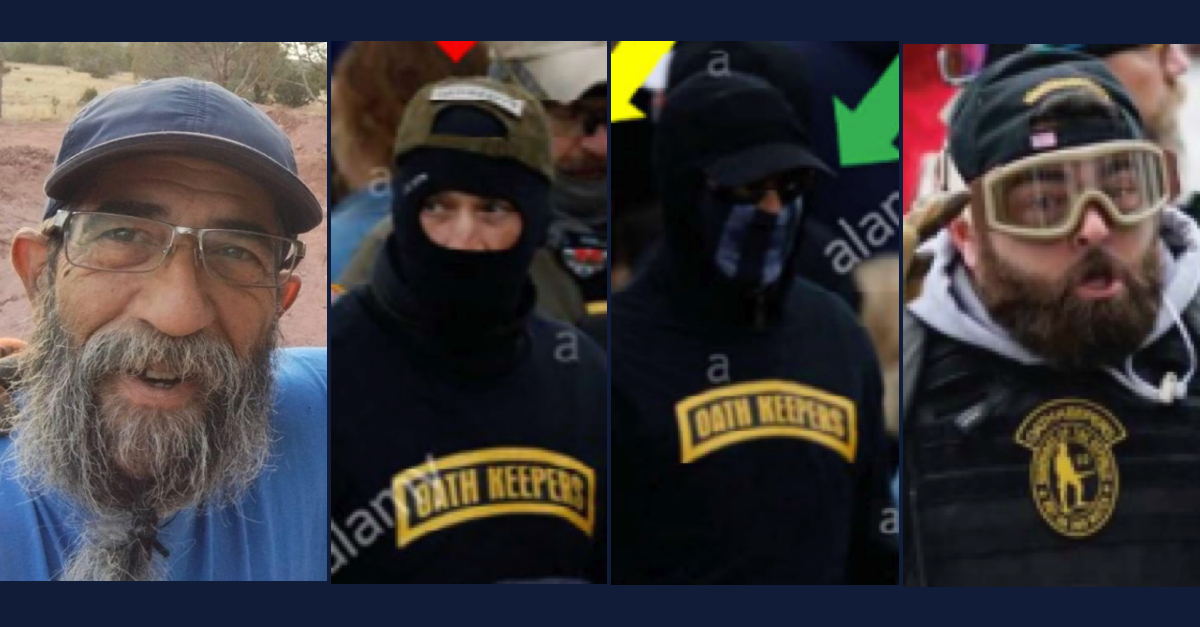
L-R: Edward Vallejo, David Moerschel, Joseph Hackett, Roberto Minuta. All four men are charged with seditious conspiracy. (Images via court filings.)
The second tranche of Oath Keepers members accused of plotting to block the transfer of presidential power from Donald Trump to Joe Biden on Jan. 6 is underway in Washington.
Jury selection in the federal government’s case against David Moerschel, Ed Vallejo, Joseph Hackett, and Roberto Minuta kicked off Tuesday morning. The trial comes just one week after the first trial of the right-wing paramilitary group’s top leaders ended with multiple convictions across the board: Oath Keepers founder Stewart Rhodes and Florida chapter leader Kelly Meggs were convicted of seditious conspiracy. While three other co-defendants — Jessica Watkins, Kenneth Harrelson, and Thomas Caldwell — were acquitted of that charge, all the defendants in the first trial were convicted of obstruction of an official proceeding of Congress.
Moerschel, Vallejo, Hackett, and Minuta are all charged with seditious conspiracy, conspiracy to obstruct an official proceeding of Congress, obstruction of an official proceeding of Congress, conspiring to obstruct an officer from discharging duties, and tampering with evidence.
Both the obstruction charge and the seditious conspiracy charge carry a potential 20-year prison sentence.
Moerschel and Hackett are accused of joining Meggs, Harrelson and Watkins in the first group of Oath Keepers members who approached the Capitol in a military-style “stack” formation.
Vallejo, who is not a member of the Oath Keepers, is accused of playing a key role in organizing the so-called Quick Reaction Force. The QRF, as it was known, stashed a cache of weapons at a Comfort Inn in Arlington, Virginia, evidence from the first trial showed. According to prosecutors, Rhodes and his co-defendants were looking to ferry the weapons across the Potomac River to the Capitol in support of the rioters’ efforts to block Biden’s certification.
Minuta allegedly joined co-defendants Joshua James and Brian Ulrich in the second “stack” that approached and breached the Capitol. This came after Minuta and James were alleged to have sped toward the Capitol in a golf cart upon hearing that the building had been breached. They were purportedly providing a “security detail” for Trump ally and pardon recipient Roger Stone, who has not been charged in connection with the events of Jan. 6.
Defense lawyers have emphasized the Oath Keepers’ alleged “security” role in the first trial, although prosecutors have repeatedly tried to cast doubt on the validity of those claims.
Eleven co-defendants total were charged in the seditious conspiracy case. Two of them — James and Brian Ulrich — have pleaded guilty to that charge and have been cooperating with the government’s investigation.
Jury selection in the first case took three full days, and was met with significant resistance from defense lawyers who insisted that their clients could not receive a fair trial from D.C. jurors. In the days leading up to this second trial, however, the case docket was relatively quiet, although it’s possible that defense lawyers may try to get the case moved after the jury has been chosen.
All four defendants in the current trial are out on pretrial release, indicating that U.S. District Judge Amit Mehta does not consider them to be flight risks or to pose imminent danger to their communities.
The trial is expected to last five to seven weeks.
[Images via court filings.]